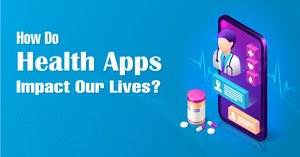How Do Health Apps Impact Our Lives?
الجسم
How Health Apps are Changing the Healthcare Landscape
Mobile health apps have come a long way, performing various functions, from medical diagnosis to prescriptions, positively impacting our lives. Also known as mHealth apps, smart devices such as smartphones, tablets, and wearables utilize these software programs to help users with their health-related concerns. According to Statista, Google Play and the App Store had around 54,546 and 41,517 apps available in the third quarter of 2022, and that same year, over 30% of the United States was using a health app.
These health apps, like JennyCo, have covered a broad spectrum of medical purposes: providing and processing information about patients, diseases, medical products, and services impacting our lives. People use them for various physical and mental health-related functions, for example, drug prescriptions, weight management suggestions, recommendations for sleep improvement, AI-based diagnosis, and diet intake. Due to the vast array of health apps available, many of us use them daily to reach our health goals and improve our overall health.
Health Apps And Their Benefits
Because of the increase in demand for health apps, healthcare entrepreneurs have built telemedicine apps that bridge the gap between the supply and demand of healthcare services in even the remotest areas. These health apps, like JennyCo, have reshaped our lifestyles significantly – and for good. Let’s explore the benefits of utilizing health apps and how they impact our daily lives.
-
Better Patient Consultation
Providing quality care to each individual is the top priority of every healthcare professional. But when patients flood into the emergency department, it can be difficult for frontline healthcare workers to pay equal attention to each patient. This is where health apps come in handy.
Using health apps in correlation with already existing medical approaches, healthcare providers attain tools that facilitate interactions more effectively and efficiently.
Utilizing health apps for medical professionals and patients during consultation has many other benefits.
-
Remote monitoring
Health apps allow for remote monitoring of patients with chronic conditions quickly and efficiently. They enable healthcare providers to track patient progress more closely, which helps providers identify potential issues early on and address them during consultations.
-
Data Sharing
-
Telemedicine
-
Integration With Wearables
-
Patient Education
Patient education empowers and encourages patients to research and better understand their overall health, allowing them to ask the right questions to their medical providers.
-
Appointment Scheduling and Reminders
Many providers offer automatic text updates for their patients, making it easy to remind them of their appointments. Instead of receiving a phone call, patients can quickly reply with a text to confirm their attendance at their scheduled appointment. Similarly, if needed, they can cancel their appointment with a simple text message.
-
Access to Specialists
-
Better Patient Engagement
Less Risk of Misdiagnosis
Managing a patient’s physical medical records could be difficult and time-consuming, leading to inaccuracies and diagnostic errors. Therefore, providers need more time to establish each patient’s physical medical history.
-
Symptom tracking
Patients use health apps to track and record their symptoms in real-time, providing healthcare providers with a more accurate and detailed picture of their condition. Symptom tracking can help providers make more informed diagnostic decisions and identify patterns that may have been missed during a brief consultation.
-
Easy Access To Personal Health Records
Health apps help patients maintain personal health records, including medical history, medications, and test results, making sharing their health information with healthcare providers easier. Sharing the health records accurately ensures that they comprehensively understand the patient’s medical background, which can aid in accurate diagnosis.
-
Artificial Intelligence (AI) and machine learning
Artificial intelligence strives to help eliminate human error, and when used in correlation with health apps, the results are astonishing. AI and machine learning allows healthcare professionals to efficiently and effectively collect and analyze data thoroughly. This technology helps healthcare professionals identify behaviors in the body that lead to essential diagnostic insights and help detect certain diseases. Additionally, more accurate diagnoses are made as technology enables healthcare providers to analyze patient results using various factors.
Easy Access to Appropriate Medical Care
Medical healthcare apps reduce the long wait times to schedule appointments or reach out for medical assistance. Apps like JennyCo have made it easier for patients to schedule appointments, send messages, and get answers to medical queries any time, any day.
The AI will help you resolve a medical emergency and connect you with the closest medical facility. The 24/7 medical representatives are available on the app, and you can easily message or call them to solve your problem instead of running to a hospital for minor issues.
-
Management of Medication
Health apps help patients manage their medications, including sending reminders about when to take them, communicating accurate dosage information, and alerting them of refills. This makes it easier for patients to follow their medication plans and avoid possible health complications.
-
Access to Support Groups
Health apps can connect patients with others with similar conditions, ensuring that patients communicate with others who share the same experiences. Because it can be challenging to find someone who can relate to their situation, these support groups help patients feel less alone and provide additional information and guidance.
The beauty of health apps is that anybody can join support groups – they are not dependent on location. After the COVID-19 Pandemic, more users turned to online video conferencing for health purposes, and support groups are also available online.
-
Early Detection of Potential Health Issues
Because providers access patient medical records remotely and efficiently, they quickly identify warning signs that might indicate a health problem. Early intervention is critical in treating diseases and preventing complications; appropriately monitoring a patient record can help.
Cost-Effective Healthcare
Healthcare apps offer cost-effective options, particularly for people unable to afford frequent or expensive visits. Those in rural areas or those who need to see a specialist on the other side of the country, greatly benefit from healthcare apps.
-
Self-management
Patients can now take control of their health using tools that integrate with healthcare apps, such as wearable devices for tracking symptoms, physical activity, and diet. Improved self-management leads to better health outcomes and reduced healthcare costs.
Health apps can be extremely useful for patients and allows healthcare providers to better use the information gathered from the fitness trackers.
-
Early Detection and Prevention
-
Reduce Emergency Room Visits
Improved Communication for Patients
-
Accessibility
Every patient has struggled scheduling doctor appointments or calling the doctor’s office for a simple question. Over time, these challenges may prevent some patients from seeking the medical care that they need. With telemedicine integration, patients can quickly seek the health support they need. Within a few clicks, patients can send messages to their doctors or book their next appointment.
Virtual consultations with healthcare professionals are more accessible than ever to book and are a great alternative to traditional in-person appointments.
-
Secure Messaging
Health apps provide secure messaging features, enabling patients and healthcare providers to exchange information privately, which in turn fosters trust and facilitates better communication.
Secure messaging helps patients communicate with their providers, from sending them a picture or asking a simple question; attending an in-person appointment every time is no longer necessary. Instead, apps allow secure and efficient communication.
Medical Revolution with Healthcare Apps
The benefits of healthcare apps multiply as they make healthcare more cost-effective and accessible; allowing patients to take control of their medical choices. Additionally, they offer the potential to improve overall health outcomes and patient satisfaction, thereby resulting in a more efficient and effective healthcare system.
Critically though, healthcare apps do not replace all healthcare challenges. Healthcare apps must be seen as additional tools working alongside traditional healthcare services; not replacements for professional medical advice and care.
JennyCo helps patients take control of their health data and information by receiving personalized insights on their health. Whether you hope to improve your physical or mental health, JennyCo has the advice you need. Sign up for their app today!










تعليقات